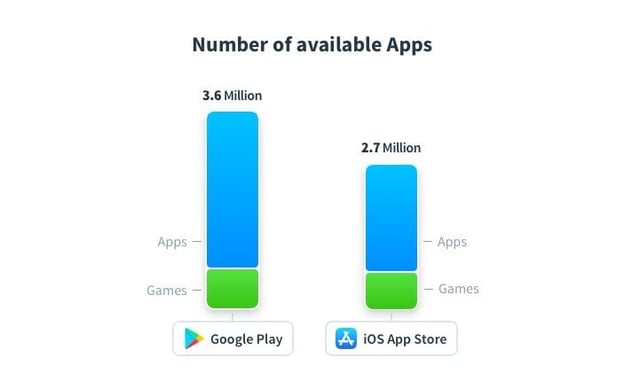iOS 14 ASO: How Apple's New Operating System Affects Mobile Game ASO
by Game Marketing Genie, on 29-Sep-2020 11:49:03
Apple has now introduced the latest version of its operating system, iOS 14, after announcing the new Apple Watch and iPad models. Alongside new features like home screen widgets, updates to important apps like Apple Maps and iMessage, and a banner-style compact UI, Apple also announced changes to the App Store that could affect your app's visibility and conversion rate.
To help you plan ahead, we have analyzed the new features to see how they affect your ASO and overall traffic acquisition.
What is ASO?
App store optimization (ASO) is the process of optimizing an app to rank highly in app store search results. Google Play (Android) and App Store (Apple) are the major app stores, and there are other smaller ones including the Baidu App Store. Apps that rank higher in app stores’ results pages are more visible to potential customers, and this usually translates into more traffic to the app's page in the app store.
In addition to a high ranking, ASO also focuses on click-through rate (CTR), meaning you have to convince users to click your app store listing once they locate it. You can achieve this by optimizing your app's name, the app description, app screenshots, and rating.

Figure 1: Image via App Radar
The need for app store optimization is because of the huge number of apps available in the major stores. More than 5 million apps are available for download, which represents the competition publishers face as they try to get their apps discovered. A recent study also found that app store search is the top method for finding and downloading apps with 63 percent of apps discovered through browsing the app store. Therefore, those who are not using ASO are missing out on the largest discovery channel available to their apps.
We have shared tips on using ASO to boost organic downloads on our blog, Game ASO: How to Make Your Video Game Stand Out in App Stores.
What’s new?
Let's look at some of the features of the recently launched iOS 14.
Improved privacy
The iOS 14 software requires developers to be more transparent with their data collection practices. From the app's product page before downloading, users will be able to see a privacy card that details the permissions they are allowing, such as:
- The data that's linked to the user or their device that the app is collecting, like contact information
- The data that’s being shared for tracking purposes across different apps and websites such as location
Figure 2: Image via Apple
These changes are good for the users as it gives them a clear understanding of the data an app is curating. Privacy-conscious users can opt-out of tracking, which means advertisers won't reach them via retargeting.
Updated app store search
Apple has also updated the way search results work by introducing type detection and spell check to the search functionality. Words will now autocomplete in the search bar when querying, meaning that searches will now be accurate.
Spelling mistakes are common especially when games have long or complex names, and developers have had to come up with strategies to maximize these typos. They may include misspellings of popular search terms in their app metadata to find higher-volume, less competitive keywords that would help them gain more organic impressions for their apps. This strategy will no longer be effective since the app store will correct the misspelling and show search results for the correct search term.
Figure 3: Image via Moburst
However, this may not apply to all languages or countries. In Belgium, an app store search where phone settings are set to French, found that the auto-correction suggestions have not yet been implemented.
Figure 4: Image via Apptweak
Editorial collections
IOS 14 tries to enhance app discoverability by introducing editorial collections in search results when one queries genre keywords like “racing games”. App store search results now have a new look with the editorial collections appearing just below the search ads banner. Apps within the collections are scrollable and can be downloaded directly from the search results by clicking the “Get” button.
Certain keywords bring up the editorial collection as the #1 search results. In this case, the app that would have ranked top for that keyword is pushed down to #3 in the list below the search ads. More apps also appear above fold since users scroll horizontally through the collections and not vertically through search results. This increases the competition for the user's attention, which could negatively affect an app's conversion rate.
App details page
iOS 14 also gives app pages a small makeover. Apple will now publish performance stats such as the app's rating and the number of reviews in an information panel beneath the app icon. App Store users will now be able to scroll through the information panel to see additional details like the app's size, the developer's name, language, and game controller support.
Later on, Apple will add a Privacy Card at the bottom of the page to help users know what data the app is tracking and sharing before downloading it.
App Clips
App Clips are small versions of apps that allow users to experience an app before installing it. App Clips appear when users scan a QR code, use NFC tags, or directly within Safari and iMessage. They are small and lightweight, allowing users to engage them without downloading the full version of the app. App Clips enable users to perform tasks like renting a scooter, ordering takeout, or making a reservation quickly when such services are urgently needed.
Figure 5: Image via Apple
Developers can use App Clips to demonstrate their apps' value without requiring users to download the app and complete the registration. App Clips work with Apple Pay, and instead of asking users for credit card information, they can pay with Apple Pay. Developers can then present users with the option to install the app and transfer all the user information to the full app.
What does all this mean?
Here is how these changes affect the ASO community,
Will affect devs user acquisition and monetization
The introduction of Privacy Cards is great for the users as it gives them a better understanding of how their data is used, but it puts devs at a disadvantage since they heavily rely on data. User-level attribution requires access to user-level data like the IDFA, and when a user denies these permissions, tracking goes to “Limit Ad Tracking” mode. This makes it harder to evaluate user behavior and optimize ads to improve revenue.
The industry will have to find ways to understand user acquisition performance. Apple is pushing developers to use its SKAdNetwork but associating attributed installs with revenues will still be challenging.

Behavioral targeting may become more difficult
When users opt-out of tracking, advertisers will not be able to reach them through behavioral targeting. Online advertising is very important to publishers, especially behavioral targeting, that displays different ads to viewers based on factors like location, browser, and websites that one has visited. The lack of behavioral targeting will make it difficult for publishers to monetize through their ad networks with Facebook warning that publisher revenue could drop by up to 50 percent because of a lack of personalization across its Audience Network.
If you choose not to track, you can no longer reach users with retargeting, behavioral targeting, lookalike audiences, etc.
It’s not just behavioral targeting that’ll become harder. When customers choose to limit the data an app can track, advertisers will not reach them through retargeting and lookalike audiences. The CPI will increase, and advertisers will have to rethink their customer engagement strategies. Ads will be less personalized because advertisers will not have enough customer data for personalization.
Need better keyword optimization
Many marketers had opted to optimize their apps for the common misspellings of their app names and general terms. This was a wise move since these misspellings often had a lower competition score, thus making it easier to rank for those keywords. With the auto-correct feature, the app store search will only show results for the correct spellings.
The search volume for the misspellings will decrease drastically, and marketers will have to revise their keyword optimization to avoid visibility loss. If you have optimized for misspellings, you’ll have to review your metadata, which may contain the misspelled terms.

Mobile game marketing strategies made easy
Mobile game marketing is your key to the quest for success! Take control of your new game and make its marketing matter with the help of our insider tips in Mobile Game Marketing: Your Complete Guide to Success.
The release of iOS 14 may shake things up for developers. Advertising will become less effective using older marketing strategies because of the data and tracking restrictions. As a developer, you should start looking at new ASO techniques to attract users for your app. The team at Game Marketing Genie can help with this.
Our gaming marketing agency will review your ASO strategy to help you improve your visibility on the app store and boost your conversion metrics. Get in touch, and let's start optimizing your app for the right keywords to increase organic installs.
Are you struggling to attract users for your app? Use these ASO tips to improve your app’s visibility and discoverability.


